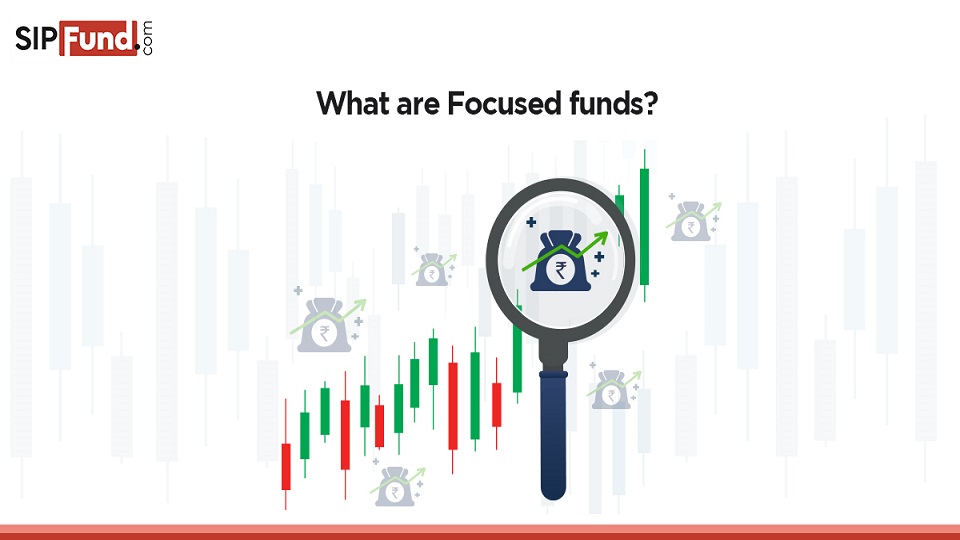
What are focused funds?
Hearing about mutual funds, the first thing that come to our mind is ‘diversification’. But there is one category of mutual funds which goes against the diversification rule. This category is known as focused fund or sometimes referred to as concentration fund. Fund managers focus on limited number of top performing stocks of some sector or stocks of a specific theme to reap higher returns. Fund houses are relying on bottom–up stock selection strategy for focused funds.
Definition
Focused funds belong to the class of equity mutual funds and these can invest in a maximum of 30 stocks in accordance with SEBI guidelines. These funds can freely invest across market capitalization in small-cap, mid-cap and large cap. Focused funds rely on the performance of just only 30 stocks in their portfolio to make profits. The strategy of focused funds is simple - research about the top performing stocks and take bet on their even higher performance. Some focused funds can make some sector or theme as their focus depending on the performance. These funds specifically look for companies which are ahead of their peers and have huge growth potential for future. These funds are sometimes also known as under-diversified funds.
How do they work?
Equity mutual funds can hold stocks in the range of 50 – 100 stocks but focused funds can hold only up to 30 stocks in their portfolio. Focused fund is allowed to invest in any company since SEBI has not placed any sector, theme or cap-based restrictions. Fund managers are free to allocate the assets between large, small and mid - cap as per their strategy and financial goals.
Why investors should invest in Focused funds?
High returns
Since money is invested only in top performing 30 stocks, the expected returns in future could be huge if fund managers’ research played out well. Under ordinary mutual funds scheme, investment get allocated amongst wide variety of assets in order to minimize risks but not all of them outperform well so returns can be low unlike focused funds. Focused fund managers select stocks after carrying out a rigorous research and then they take bet on these companies with full conviction that they will outperform.
Flexibility
The greatest advantage that these funds enjoy is freedom to invest across market capitalization. There is no cap on investment for focused funds by SEBI. They are free to adjust their portfolio as per the conditions prevailing in the market.
Well-researched
Focused funds have exposure to only 30 top performing stocks and fund manager devote considerable amount of time in research and assessment in order to pick the best stocks. Rigorous research and in-depth analysis are very crucial for focused fund managers since they want to pick the best of stocks which can outperform and provide higher returns than any other mutual fund schemes. Fund managers have a great amount of conviction that their selected stocks will beat the stock market returns and most of the times this belief made them winners in the market.
Are focused mutual funds for everyone?
Firstly, Investors who are capable and willing to take some risks can choose focused funds since these are riskier than other funds. Risk is attached because of the concentration of funds in just 30 stocks, if fund manager misses the hit even in few bets then there is a possibility of huge losses.
Secondly, Investors having prior experience in mutual fund investing can choose focused funds provided their financial goals are in line with the fund managers’ strategy. Novice investors are suggested not to pour their money in focused funds because of their volatile nature.
Lastly, Investors having a longer-term investment horizon at least of 5 years can lock in their money in focused mutual funds. Since these belongs to equity class of mutual funds, these demand minimum five years to give higher returns. Selective bets taken by fund managers take time to beat their past performance so long-term horizon and patience are crucial for you if you want to choose focused funds to multiply your wealth.
Precautionary points
Focused funds carry concentration risks with them since they have a narrow portfolio than ordinary mutual funds. However, these funds have not incurred enormous losses and able to recover well in coming years if not performed well in some year. There is no denying that if portfolio consists of all stocks of some sector like mining and if mining does not perform well then this could mean huge losses for the fund. It is advisable to have a glimpse of the stocks that the fund is having in its portfolio and if they are spread across various sectors then it is safe to invest. If the fund has concentrated just in one sector, then you need to pause and think again before investing.
The table below shows the returns of some of the top performing focused funds:
| FUND SCHEMES NAME | Category | 1 Year Return | 3 Year Return | 5 Year Return |
|---|---|---|---|---|
| IIFL Focused Equity Fund | Focused | 29.67% | 14.16% | 17.44% |
| Axis Focused 25 Fund | Focused | 26.05% | 12.50% | 17.87% |
| DSP Focus Fund | Focused | 14.53% | 7.45% | 12.17% |
| ICICI Prudential Focused Equity Fund | Focused | 30.76% | 8.27% | 12.91% |
| SBI Focused Equity Fund | Focused | 18.63% | 9.13% | 14.45% |
Conclusion
Investors may get excited to invest in focused funds given their higher returns prospects but there are other factors behind higher returns which needs to be considered before investing. It is a good practice to determine your financial goals, risk appetite and the time for which you are willing to lock your money in focused funds. It is true that these funds are volatile but with enough time and research by the fund managers to pick the topmost stocks can turn out to be a great bet for investors.

